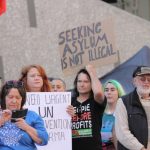The Offence of Providing False Documents or False or Misleading Information Relating to Non-Citizens

Former Federal Labor MP Craig Thomson has been charged over an alleged fraudulent visa scheme worth millions of dollars.
The charges follow a joint investigation by the Australian Federal Police (AFP), Australia Border Force (ABF), Australian Taxation Office (ATO), AUSTRAC and the Department of Home Affairs, which began in 2019.
Mr Thompson has now been charged with providing false documents and false or misleading information relating to non-citizens, as well as breaching restrictions on charging fees for immigration assistance.
‘Cash for visas’
His arrest comes after the investigation uncovered evidence of a ‘cash for visa’ scheme, which allegedly took advantage of vulnerable visa holders who were not fully aware of Australian workplace laws and entitlements.
Mr Thompson is accused of facilitating more than 130 fraudulent visa applications – for workers in the food service and regional farm worker industries, resulting in a benefit of more than $2 million.
He appeared was granted bail in Gosford Local Court under strict conditions, including that he surrender his passport, not leave the Greater Sydney and Newcastle area, and refrain from contacting witnesses and business associates.
Not the first time
It’s not the first time that Mr Thompson has been in trouble with the law.
He was officially expelled from the Labor Party in 2014 after he was found guilty in the County Court of Victoria of thirteen counts of theft from the Health Services Union.
His crimes included using the stolen money to solicit prostitutes and pay personal expenses.
He was convicted and fined $25,000.
His charges of obtaining financial advantage by deception, which is an offence under section 134.2 of the Criminal Code Act 1995 (Cth) were ultimately dismissed on appeal.
The offence of providing false documents or false or misleading information relating to non-citizens
Section 234 of the Migration Act 1958 (Cth) prescribes a maximum penalty of 10 years in prison for a person who provides false documents, or false or misleading information, relating to non-citizens.
The section states that:
- A person shall not, in connexion with the entry, proposed entry or immigration clearance, of a non-citizen (including that person himself or herself) into Australia or with an application for a visa or a further visa permitting a non-citizen (including that person himself or herself) to remain in Australia:
(a) present, or cause to be presented, to an officer or a person exercising powers or performing functions under this Act a document which is forged or false; or
(b) make, or cause to be made, to an officer or a person exercising powers or performing functions under this Act a statement that, to the person’s knowledge, is false or misleading in a material particular; or
(c) deliver, or cause to be delivered, to an officer or a person exercising powers or performing functions under this Act, or otherwise furnish, or cause to be furnished for official purposes of the Commonwealth, a document containing a statement or information that is false or misleading in a material particular.
It further provides that:
- A person shall not transfer or part with possession of a document:
(a) with intent that the document be used to help a person, being a person not entitled to use it, to gain entry, or to remain in, Australia or to be immigration cleared; or
(b) where the person has reason to suspect that the document may be so used.
It is important to be aware that, in order to establish the offence, the prosecution is required to prove each inherent element (or ingredient) beyond a reasonable doubt.
A defendant is entitled to an acquittal if the prosecution is unable to do so.
A defendant is also entitled to an acquittal if he or she raises evidence of a legal defence – such as duress or necessity – which the prosecution is then unable to disprove beyond a reasonable doubt.
Examples of the offence
The offence may arise where the following relate to a non-citizen:
- Fake identity documents such as a passport, birth certificate or marriage certificate,
- Fake qualifications including fake degrees or diplomas, as well as fake work experience or skills information,
- Failing to declare a criminal conviction or criminal record,
- Failing to declare marriage status or information about children or other dependents,
- Digitally altered photos to support relationship status,
- Giving inaccurate statements or information in a declaration, or
- Omitting relevant information, such as factors which may affect general health status.
Going to Court?
If you have been charged with an offence under the Migration Act 1958 (Cth), call Sydney Criminal Lawyers anytime on (2) 9261 8881 for specialist advice and exceptional representation from lawyers with in-depth knowledge of the area – including what the prosecution must prove in order to establish the offences, who are vastly experienced in defending prosecutions under the Migration Act and have an outstanding track record of getting charges withdrawn or, where they nevertheless proceed to defended hearings or jury trials, dismissed in court.








